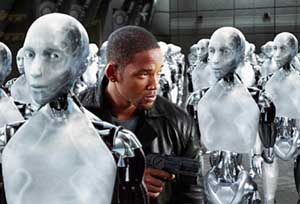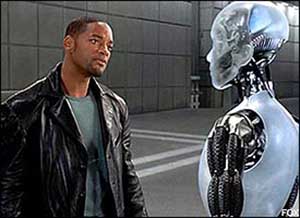-
- Colorado group launches GLBT advocacy ads
- Same-sex couples in Tampa, Orlando sue to challenge state marriage ban
- Group’s activities stir controversy over pastors’ politics
- Unlikely activists: ACLU draws diverse group for lawsuit
- Senior couples not quick to register as domestic partners
- Judge orders New York police department to rethink AIDS disability
- National News Briefs
- World News Briefs
Arts & Entertainment
Robot murders, crumbling marriages
Published Thursday, 22-Jul-2004 in issue 865
I, Robot
**1/2
Directed by Alex Proyas
Written by Jeff Vintar and Akiva Goldsman
Starring Will Smith, Bridget Moynahan, Bruce Greenwood
It’s been 53 years since esteemed science-fiction writer Isaac Asimov penned his nine-story collection, I, Robot. After bouncing in and out of development hell over the decades (SF author Harlan Ellison wrote a version for 20th Century Fox in 1978 that was never made), I, Robot has finally made it to the big screen. Entertaining though it may be at times, I can’t say it was worth the wait.
Even with nine stories at their fingertips, screenwriters Jeff Vintar and Akiva Goldsman (the man who ruined both Lost in Space and two Batman sequels) ended up building their script around a character who wasn’t even in the book, a “robotophobic” police detective named Del Spooner (Will Smith, displaying his trademark charm along with a killer bod). The year is 2035, we’re in Chicago, and domesticated robots are everywhere, much to Spooner’s annoyance. A new, improved version of the NS-4 is just days away from release — there will be one robot for every five humans, we’re told – when a top-ranking scientist at US Robotics, Dr. Alfred Lanning (James Cromwell, currently on Six Feet Under), is found dead, splattered on the sidewalk after a leap from his office window. To everyone else it looks like an open and shut case of suicide, but to the sharply-dressed renegade cop, who’s forever getting chewed out by boss Chi McBride (a tiresome cliché), all signs point to murder — by a robot.
One of the “Three Laws of Robotics” may dictate that a robot “allow no human to come to harm,” but Spooner is convinced, thanks to a holographic message from Dr. Lanning, that “Sonny” (a memorable Alan Tudyk, doing what Andy Serkis did so well as Gollum in the Lord of the Rings trilogy) had something to do with Lanning’s demise. That can’t be, reasons stunning “robopsychologist” Susan Calvin (The Recruit’s Bridget Moynahan); robots are not only totally compliant to us, they can’t feel anything and therefore would have no motivation to kill anyone. But, as Spooner learns as he goes deeper into his investigation, it could well be that robots are naturally evolving, that they are developing the capacity to think, perhaps even dream. Could they therefore be capable of an extreme act of violence? A reluctant Calvin teams up with Spooner to find out what smooth-talking US Robots president Lance Robertson (Bruce Greenwood) is hiding.
From this point on, I, Robot all but discards Asimov’s intriguing philosophical ideas and becomes just another lavishly produced, slam-bang action vehicle for its star, complete with the idiotic, overused “firing two guns at the same time while soaring through the air” shot. That isn’t to say what’s on screen isn’t often appealing. Alex Proyas (Dark City), an intensely visual director who made the stylish Dark City), smartly showcases — with the help of cinematographer Dariusz Duggan—Digital Domain’s superior FX and the knockout production design by Patrick Tatopoulos (Dark City, Independence Day), whose robots are the essence of elegance with their translucent bodies, smooth faces and large, glassy eyes. Proyas also has a couple of clever, well-executed action sequences up his sleeve, one of which has Spooner rescuing Dr. Lanning’s cat from a rampaging “demobot” (sort of a self-propelled bulldozer).
Still, all the pyrotechnics aren’t enough to disguise the film’s lack of smarts, which becomes increasingly apparent as the movie unwinds. (And am I the only one who felt that Spooner’s hatred of robots seems insufficiently motivated, even irrational?) Proyas admits upfront that his adaptation isn’t faithful, that he was concerned only with the “spirit” of Asimov’s book. (That’s what directors say when they’ve basically scrapped their source material.) For all the distractions made possible by so much chrome and leather and all-around shininess, it seems to me that we should feel just a little smarter as a result of visiting Asimov’s prescient vision of the future. One leaves I, Robot wondering what might have been. (Playing citywide)
The Door in the Floor
*1/2
Written and directed by Tod Williams
Starring Jeff Bridges, Kim Basinger
It sounds like a juicy horror thriller, but Tod Williams’ adaptation of John Irving’s best-selling book, A Widow for One Year, is just plain horrific, an exceedingly dreary, clumsily constructed look at a crumbling, dysfunctional marriage. (What, again?) A porky Jeff Bridges (why do middle-aged actors wait until they look like Orson Welles to start parading around in their birthday suits?) plays the exhibitionistic Ted Cole, a children’s book author and illustrator (the film’s title comes from one of his books) living in East Hampton, New York, with his emotionally damaged wife, Marion (Kim Basinger), and their 4-year-old daughter, Ruth (Elle Dakota).
Marion, it seems, is still grieving over the death of her two teenage sons in a car accident in which she and Ted were involved. Her slow-motion gait and manner of speech suggest a woman whose grasp on life is tenuous at best. While Ted hooks up with the models he paints (I must admit I gasped when Mimi Rogers bared her considerable, full-frontal all), a sad, laconic Ruth attaches herself to Ted’s new college-age assistant, Eddie O’Hare (Jon Foster), who brings to the Cole family a whole new level of melodrama.
Bridges and Basinger are extremely watchable, as always (though I wish she had had more to do), but The Door in the Floor is Foster’s film. In his performance we see a young man who suffers a loss of innocence as he goes from do-good personal assistant to bedding Marion, realizing along the way that the great Ted Cole is just as screwed up and haunted as she is. I don’t think that’s quite enough reason to see The Door in the Floor, however, which plods endlessly along with no obvious purpose (or point). The filmmakers’ decision to film only half of Irving’s book might be the problem: Something’s missing here. (Landmark’s Village)
Kyle Counts is the film critic for the Gay & Lesbian Times
Rating System
**** a must-see
*** good
** average
* poor
BOMB (think Superfly T.N.T.)
|
|
Copyright © 2003-2025 Uptown Publications





